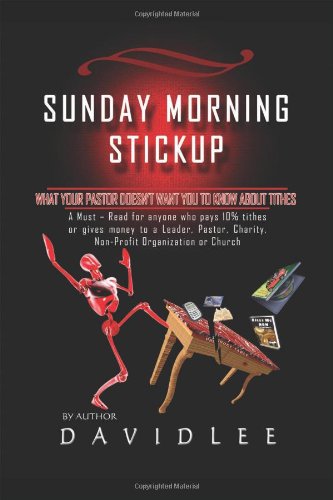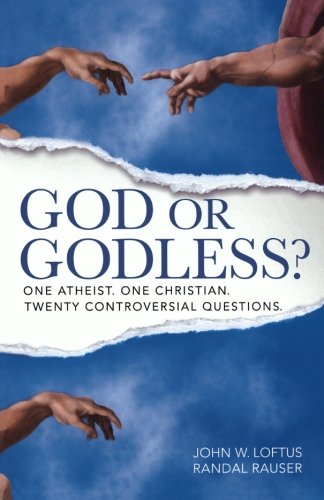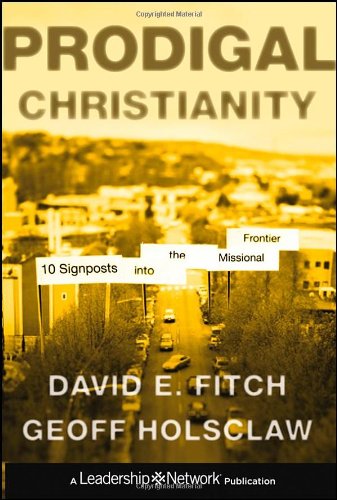Book review: Sunday Morning Stickup
by David Lee
★★★
It is written, My house shall be called the house of prayer; but ye have made it a den of thieves. –Matthew 21:13
This book is a passionate plea to quit supporting a prosperity gospel. Tithing is no longer scriptural, and your tithes aren’t used in a scriptural manner anyway. David Lee wrote the book “out of obedience to a mandate from God on my life,” and I can’t emphasize the word “passionate” enough. David has had it with misuse of money. He misses the good old days of revivals and cozy corner churches, not megachurches and Rolexes. Man, what power the church had back then, when the Spirit ruled the house! REAL laying on hands, REAL healings. Thank you, Jesus!
The downside of this passion is that it manifests itself in condescending reader participation (exercises and instructions and pleas to read the book over and over), and David sometimes comes across as preachy or as a bit of an alarmist. So the book’s atmosphere didn’t really gel with me.
Yet the topics were worth reading. The New Testament shows no evidence whatsoever of tithing, and in fact, Paul boasted that he provided the gospel without pay, and supported himself by working on the side. Paul, of course, had no church building. Moreover, tithing in the Old Testament wasn’t about money; it was about goods, which would feed the priests and the hungry. That doesn’t mean we shouldn’t give freely of our time, money and goods! It just means obligatory, guilt-inducing tithing no longer has a place.
So what changed from the Old Testament to the New Testament? Jesus. Tithing in the O.T. is symbolic of Jesus, who would offer his life on the cross as a living tithe. See Hebrews chapters 7 through 10. An interesting theology, which I hadn’t considered before.
So if you don’t find the style off-putting, read the book and share in David’s indignation.

Genesis 30:13, The Twelve Tribes of Israel, part II of II
Then Leah said, “How happy I am! The women will call me happy.” So she named him Asher.
//Yesterday, I asked whether the twelve tribes of Israel preceded the story of the twelve sons of Jacob. This would mean the stories told in the Bible were allegorical, meant to unify existing tribes, rather than to present the true history of Israel’s origin.
The tribe of Dan, for example, appears to be somewhat of a late comer, as discussed yesterday. Yesterday’s verse may provide a hint that Dan came from the west…not out of Egypt. Many scholars have speculated about whether they may be the Sea Peoples called the Danaoi or the Danuna.
Other tribe names may also hint of a different origin than that told by the Bible. The name Asher, in today’s verse, may come from Assur, the Assyrian god, or Asherah, the Canaanite goddess. Gad’s name means “good fortune,” but it is also the name of a Canaanite god. Zebulun, in Hebrew, may mean “gift” or “honor”, but it is also an epithet of Baal, another Canaanite god. It’s not surprising that many scholars conclude these tribes were never among the invaders of Canaan, as the story of Israel goes, but rather more original inhabitants … the ones invaded.
If the book of Judges gives any hint, the “twelve” tribes may have been more autonomous in their early days, and banded together as needed for mutual protection. The six sons of Leah—Reuben, Simeon, Levi, Judah, Issachar, Zebulon—may have had stronger ties with one another than the remaining six.
The official uniting, then, may have come in the time of Joshua. If you’re interested in the topic, read the covenant language of Joshua chapter 24.
Judges 5:17, The Twelve Tribes of Israel, part I of II
Gilead stayed beyond the Jordan. And Dan, why did he linger by the ships? Asher remained on the coast and stayed in his coves.
//As the story goes, Jacob (later named Israel) had twelve sons, and these twelve sons became the twelve tribes of Israel. Here is a list of the twelve as we usually see them:
Reuben
Judah
Naphtali
Issachar
Zebulun
Simeon
Dan
Gad
Asher
Benjamin
Ephraim
Manasseh
But something is amiss with this list. What about the other tribes the Bible tells of? Where are the Gileadites, Calebites, Kenites, Gibeonites? Today’s verse, for example, includes Gilead and asks why the tribe of Dan remained “by the ships.” Indeed, Judges 18:1 verifies that Dan had not settled at the same time as the other “eleven:”
In those days Israel had no king. And in those days the tribe of the Danites was seeking a place of their own where they might settle, because they had not yet come into an inheritance among the tribes of Israel.
Dan never did quite fit in. In the book of Revelation, he is excluded from the City of God. Genesis 49:16, the blessings of the twelve sons, speaks of Dan as disconnected from the rest:
“Dan will provide justice for his people as one of the tribes of Israel.”
Is Dan a latecomer to the twelve? What about the other tribes, not listed among the sons? Indeed, the Bible lists more than twenty tribes, though never all at the same time. Is “twelve” an artificial number, though there were many more? Is the story of the twelve sons of Jacob nothing more than an attempt to present already-existent tribes as related, so as to encourage unity?
Tomorrow we’ll look at a few of the twelve individually, and see if we can uncover some clues.
Book review: God or Godless?
by John W. Loftus and Randal Rauser
★★★★★
Definitely a contender for The Dubious Disciple’s top-10 religion books of 2013. Even the cover is magnificent.
John, an atheist, goes head-to-head with Randal, a Christian, on twenty controversial topics. Each topic is covered in debate fashion, with the contestants presenting their arguments, counter-arguments, and closing statements. It’s friendly for the most part, but the gloves do come off in a couple places.
Two very different philosophies shine through. Rauser’s penchant for imagination and storytelling contrasts John’s trust in cold, hard probability. It’s classic, almost stereotyped … great stuff.
For my own amusement, I rated and tallied up the score. My scoring was 6-4, with 10 ties, in favor of….
Wait a minute. If there’s one single debate that is critical, that reaches down to the core of Christianity, it’s #19. Did Jesus rise from the dead. This is also head-and-shoulders the most interesting of the twenty debates. And the winner on this one is … unfortunately, nobody. A push. No decision.
Another way to choose the winner is to read the book’s concluding remarks. Rauser’s passionate plea for meaning versus Loftus’s argument that Christianity has hardly risen to the surface above all the rest of the world’s religions to earn a debate against atheism. It was such a fitting close to the book that I couldn’t help awarding both contestants a win.
Ah, well, I guess that’s why I’m known as an “agnostic Christian.” Thanks, John and Randal, for a great time.

Leviticus 22:11, Slavery in Israel
But if a priest buys a slave with money, or if a slave is born in his household, that slave may eat his food.
//In this verse It appears that the Levitical law takes slavery for granted. Buying and selling slaves was a way of life.
Now, I’ve heard it argued that “owning” a slave in Bible days was a bit different than the slave ownership of America before the civil war. That a better comparison to Israelite slavery would be like the way the Denver Broncos now own superstar Peyton Manning. But I don’t really buy it.
Can we be thankful, however, that the New Testament abolishes the idea of slavery? Didn’t Paul promise, “there is no longer slave or free … for you are all one in Christ Jesus?” Yes, Paul said that, but note the provision. In Christ Jesus. Paul was writing to Philemon, but not to criticize Philemon for owning other slaves. He was writing to encourage Philemon to accept Onesimus, a runaway slave, back in a new status … because Onesimus had converted to Christianity.
Likewise, the Old Testament repeatedly discusses the humanitarian expectations God expects of his people … toward their fellow Israelites! God called his people out of slavery, and didn’t want them back in that role again.
If one of your countrymen becomes poor among you and sells himself to you, do not make him work as a slave. … Because the Israelites are my servants, whom I brought out of Egypt, they must not be sold as slaves. … Your male and female slaves are to come from the nations around you; from them you may buy slaves. You may also buy some of the temporary residents living among you and members of their clans born in your country, and they will become your property. You can will them to your children as inherited property and can make them slaves for life, but you must not rule over your fellow Israelites ruthlessly.
One might conclude that the Bible disapproves of slavery for people of like faith, but assumes its legitimacy for heathens. Thoughts?
Daniel 12:7, Scattering the Jews
And I heard the man clothed in linen, which was upon the waters of the river, when he held up his right hand and his left hand unto heaven, and sware by him that liveth for ever that it shall be for a time, times, and an half; and when he shall have accomplished to scatter the power of the holy people, all these things shall be finished.
//Many people today believe that the end of the world will be triggered by the return of Jews back to their homeland. This is a common theme in the Bible, the return of God’s people to their holy land, when God would begin an era of righteous reign. The book of Revelation presents a beautiful picture of a holy city with twelve gates, one for each of the twelve tribes of Israel, to welcome them all home. Today this return home theme has taken on such an eschatological meaning that many Christians welcome any political events that seem to be encouraging the Jews to go back to Judea, so that the world can come to an end.
Curiously, this is a belief that seems to ebb and flow. Centuries ago, the most common belief was that the world would not end until the Jews were scattered from their homeland! Proponents of this thinking would quote today’s verse in Daniel.
Any Jews reading this? Do something, you guys, whether you come or go doesn’t seem to matter. But don’t just sit there.
Book review: Prodigal Christianity
by David E. Fitch and Geoff Holsclaw
★★★★★
While this book was more conservative than I expected, it was also more thought-provoking. Prodigal Christianity compares the journey of Jesus into our world to the prodigal son (obviously a little different take on that parable) and asks if our own Christianity is prodigal enough. The authors are talking about the missional frontier, and how we are spreading the Gospel. To become Christian is to learn to become prodigal.
One quote on page 69 helped set the tone for me: “New Testament scholar E.G. Selwyn notes that the term for witness (marturian) is used six times more frequently in the New Testament than the term for preaching (kerygma) when discussing the gospel. In other words, New Testament writers more easily thought of the gospel being carried into the world through the process of witness rather than by any singular act of pronouncing or proclaiming.”
But how do we witness? Toward the end of the book, we read: “We do not go to our town councils and dictate what we think should be done based on our interpretation of the Bible. We must inhabit a place and listen. We must come to know people as friends. We must presume we have much to learn about God through them. And then God will use our joining in with the neighborhood to bring fresh eyes and fresh words and Christ’s authority against oppression and evil.”
The book’s humble introduction isn’t really indicative of what you’ll find inside. This really is intelligent writing and probing discussion. The experiences of the authors, planting their little Life of the Vine church near Chicago, are relevant and eye-opening. Which approach is best in a post-Christendom culture no longer dominated by guilt: presenting a (personal) “plan of salvation” or a (communal) “story of salvation?” Does a substitutionary view of atonement trivialize the Gospel, leading Christians to become preoccupied with the afterlife and treating day-to-day living as an afterthought? What does the Eucharist really mean in today’s world, in terms of welcoming outcasts to the dinner table?
As a liberal Christian seeking common ground with my more conservative brethren, this is a book I can endorse. Luckily, it’s also an engaging read.

John 13:5, Washing Our Feet
After that [Jesus] poureth water into a basin, and began to wash the disciples’ feet, and to wipe them with the towel wherewith he was girded.
//In The Year of the Lord’s Favor, author Tom Arthur speculates that by the time John’s Gospel was written, the feast of the Lord’s Supper had already become a stale ritual, its wine probably served in sterile little glasses like many churches do today. If anyone did arrive hungry and needy, he was treated to a mere nibble. So, in John’s account, the Eucharist is replaced with a much more personal activity: washing another’s feet. Is John recommending a new ritual?
We know, of course, that John’s ritual could not work today. The meaningful event would merely be moved up in time, completed within the privacy of our own homes, as we each spend twenty minutes vigorously scrubbing our feet, then painstakingly trimming and painting our toenails before selecting the finest pair of shoes in our closet. Then we drive off to church—no dusty road in our journey! All trace of humanness and need would be rinsed away before the church washing had a chance.
So what are we to do? How can we possibly restore the original flavor of Jesus’ act of foot-washing, and should it be a part of our gathering together?
Numbers 12:10, Black and White
And when the cloud departed from above the tabernacle, suddenly Miriam became leprous, as white as snow.
//Maybe you’ve heard this story of how God strikes Miriam, the wife of Aaron, with leprosy. Ever pay attention to what she was being punished for? A few verses earlier, we read:
Then Miriam and Aaron spoke against Moses because of the Ethiopian woman whom he had married; for he had married an Ethiopian woman. –Numbers 12:1
The distinguishing mark of an Ethiopian, of course, is the color of their skin. Can the Ethiopian change his skin or the leopard its spots? (Jeremiah 13:23).
Miriam complained because Moses married a black woman. Her punishment, fittingly, was to be made white as snow.
Book review: Jesus Wants To Save Christians
by Rob Bell and Don Golden
★★★★★
Ouch. Several months ago, Harper One sent me a short collection of Rob Bell reprints to review. I slowly worked my way through them, enjoying each one, and somehow left this one sitting on the shelves. Too many other obligations. I just now picked it up, and read it in one sitting.
I couldn’t put it down. Forget Velvet Elvis. Forget Love Wins. This 180-page sermon, this little obscure work, is for Bible groupies Bell’s real masterpiece. It’s definitely my new favorite, so maybe that says something about co-author Don Golden, a name I hadn’t come across before.
From the Exodus, to the Temple construction, to the Eucharist, Bell and Golden reveal a surprising thread that weaves its way throughout the Bible. This “new perspective ” opens up what the Bible means to Americans today, living in the world’s most powerful nation, boasting the greatest military, yet holding the strongest responsibility for the world’s impoverished. America is an empire, and the Bible has a lot to say about empires.
“I hope you see that there is a common humanity we share with everybody alive today, and everybody who has come before us,” writes Bell in the preface. This little book accomplishes just that.


















 354 Circles
354 Circles
 603 Goodreads Friends & Fans
603 Goodreads Friends & Fans

 Hello! I'm an author, historical Jesus scholar, book reviewer, and liberal Christian, which means I appreciate and attempt to exercise the humanitarian teachings of Jesus without getting hung up on any particular supernatural or religious beliefs.
The Bible is a magnificent book that has inspired and spiritually fed generations for thousands of years, and each new century seems to bring a deeper understanding of life’s purpose. This is true of not only Christianity; through the years, our age-old religions are slowly transforming from superstitious rituals into humanitarian philosophies. In short, we are growing up, and I am thrilled to be riding the wave.
I avidly read all thought-provoking religion titles. New authors: I'd love to read and review your book!
Hello! I'm an author, historical Jesus scholar, book reviewer, and liberal Christian, which means I appreciate and attempt to exercise the humanitarian teachings of Jesus without getting hung up on any particular supernatural or religious beliefs.
The Bible is a magnificent book that has inspired and spiritually fed generations for thousands of years, and each new century seems to bring a deeper understanding of life’s purpose. This is true of not only Christianity; through the years, our age-old religions are slowly transforming from superstitious rituals into humanitarian philosophies. In short, we are growing up, and I am thrilled to be riding the wave.
I avidly read all thought-provoking religion titles. New authors: I'd love to read and review your book!
 Hi! While Lee writes the articles and reviews the books, I edit, organize, and maintain the blog. The views expressed here are Lee's but I'm his biggest supporter! :-)
Hi! While Lee writes the articles and reviews the books, I edit, organize, and maintain the blog. The views expressed here are Lee's but I'm his biggest supporter! :-)
Connect With Me!